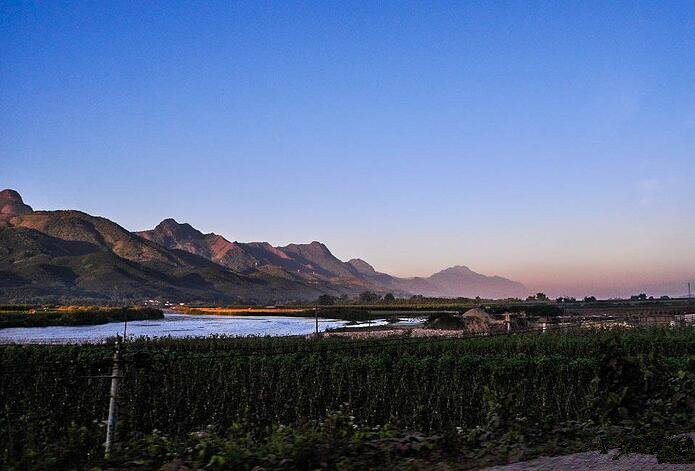Mengding Basin in Gengma County, Lincang
Overview
Mengding Basin (孟定坝) is an alluvial wide valley basin formed by the erosion and deposition of the Nanti River (南汀河) since the 4th century. Surrounded by hills, the Nanti River flows from the northeast to the southwest, traversing the entire basin. Situated near the Tropic of Cancer, it has a typical subtropical monsoon climate characterized by long sunshine hours and frost-free years. Due to extreme heat, there is a local saying that translates to “If you think of Mengding Basin, first marry off your wife,” reflecting the area’s challenging living conditions. “Mengding” in Dai (傣语) means “a basin where one can play the zither.”
To the west of Mengding Town (孟定镇) is the Kokang Autonomous Region (果敢自治区) in Myanmar. The town is notably accessible through the Qingshui River Port (清水河口岸), known as the “Golden Port,” leading to the sensitive northern regions of Myanmar. As a result, various anti-fraud slogans are visible throughout the town, creating a unique landscape.
Travel Information
Starting from Lincang City (临沧市), the journey to Mengding Basin is about 170 kilometers and takes approximately 3.5 hours. The route is predominantly a two-lane mountain road with heavy trucks, so drivers should exercise caution.
As you approach Mengding, you will encounter several checkpoints where you need to lower your windows to scan your ID card. It’s essential to ensure that all passengers are wearing seat belts, especially in the back seat.
Historical Background
Historically, the area suffered from tropical epidemics such as malaria due to a lack of medical resources. Many long-term residents were unable to escape these conditions, leading to a notorious reputation for old Mengding Basin.
After the founding of New China, significant improvements were made over decades with strong government support, leading to advancements in transportation, communication, and healthcare. The previously uninhabitable conditions have drastically changed, and Mengding Basin has developed into a national-level port, earning its title as the “Golden Port.” The once barren land is now filled with fragrant fruits and abundant crops, transforming it into a granary. The local population is gradually moving towards prosperity under favorable circumstances.
Scenic Features
The journey to Mengding Basin is marked by lush green peaks and dense forests, with tropical vines flourishing along the roadside. The mountains echo with the sounds of birds and the occasional calls of wild animals. Following the disarmament, wildlife has become more accustomed to human presence, creating a harmonious coexistence. Occasionally, you might spot a wandering leopard cat.
At the foot of the mountains lies a modern commercial development area, with well-paved streets and the sounds of nature creating a picturesque scene reminiscent of a paradise.
Mengding Basin is renowned for its excellent water and soil conditions, nurturing tiered rice paddies that thrive in a peaceful agricultural atmosphere. In the early 1950s, the Lincang area established a rubber demonstration garden in Mengding Town. A commemorative plaque marked the initiation of the “Mengding Basin 10,000-acre Rubber Demonstration Garden” project, attracting soldiers and pioneers from across the country to cultivate this fertile land.
Investments have been made in the Nanti River region along the Myanmar border to plant rubber, macadamia nuts, watermelons, and grapefruit. Currently, these economic fruit-bearing plants have matured and are being harvested, enriching Mengding Basin with valuable produce.
Economic Development
Today, the total area for private rubber cultivation in the basin is 72,000 acres, with 51,000 acres currently tapped, yielding 3,094 tons of dry rubber annually, worth over 30 million yuan. This industry involves 10 village committees, 118 villagers’ groups, and over 34,000 residents, with an average income exceeding 900 yuan, accounting for 60% of the farmers’ total income. Rubber has become one of the pillar industries in the area.
Under the national strategy of developing the western region, Mengding Basin has initiated new projects with investments totaling 200 million yuan to address issues related to the old farmers’ market. This includes investments of 2.5 million yuan to build a fish farming facility spanning 68.83 acres, 45 million yuan for the construction of a China Border Trade City, and 12 million yuan to expand the Mengzhou Wang Winery. As a result, Mengding Basin is experiencing a booming development landscape characterized by active trade and community prosperity.
In 2005, approximately 170,000 people exited the border, and nearly 30,000 vehicles crossed, with total imports reaching 75.8 million yuan. The trade volume has surpassed that of Mangka (芒卡) and Nansan (南伞), making it the most prosperous commercial port in Lincang.
The Dai (傣族) people have embraced the information and economic era, and under the guidance of the government’s policies to enrich the populace, Mengding Basin has transformed dramatically, exhibiting vibrant growth and vitality.
How to Get There
By Car: Drive from Lincang City to Mengding Basin, following local signage along the mountain roads.
By Bus: Buses run regularly from Lincang City to Mengding Basin. Upon arrival, you can explore the local area on foot.
Travel Tips
- Best Time to Visit: The ideal time to visit is during the dry season, typically from October to April, when the weather is pleasant and suitable for exploration.
- Safety: Be cautious when traveling on mountain roads, especially around heavy vehicles and checkpoints.
- Local Culture: Familiarize yourself with the local customs of the Dai people and engage respectfully with the community.
- Health Precautions: Due to the area’s history with tropical diseases, consider taking preventive measures, such as vaccinations and anti-malarial medications, before your visit.















